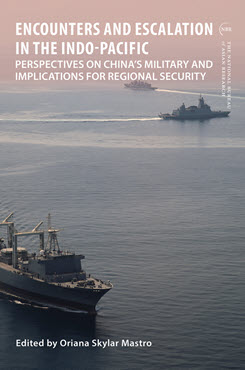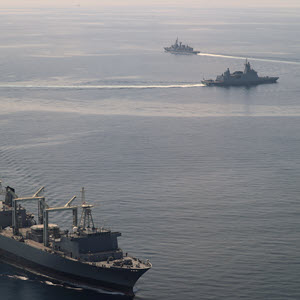Regional Experiences with the PLA and Implications for Deterrence
EVENT VIDEO
The Issue
The strategic environment in the Indo-Pacific region is undergoing dramatic changes, particularly in the military domain. The Indo-Pacific is home not only to several of the world’s largest economies and populations but also to a majority of the world’s nuclear states, the largest militaries, and five nations allied with the United States through mutual defense treaties. These conditions underscore the Indo-Pacific region’s vital importance to global stability and make even more pressing the urgent challenges and threats facing regional security and prosperity.
In addition to the various tools of coercion that the People’s Republic of China (PRC) is using against its Asian neighbors—from economic sanctions and diplomatic pressure to political warfare and information operations—to advance its interests and achieve its strategic objectives, it also has become less reticent about employing its military might. A concerted multi-decade military modernization campaign intended to transform the PLA into a “world-class” military by midcentury has witnessed significant improvements to the PLA Navy’s maritime and power-projection capabilities, an expansion of the PLA Rocket Force’s conventional and nuclear missile arsenals, and the creation of an increasingly modern joint force capable of a complex range of operations.
The PRC’s military coercive measures are often directed against the United States’ Indo-Pacific allies and partners, both at sea and on land. As part of so-called “maritime rights protection” operations, the China Coast Guard and People’s Armed Forces Maritime Militia harass Japanese, Australian, and Philippine vessels sailing in international waters on a regular basis. Chinese military forces are also engaged in aggressive patrolling at the Line of Actual Control, a potent flashpoint between India and China along their disputed land border. In response to the PRC’s increasing aggression, Indo-Pacific countries are working alongside the United States to enhance deterrence and uphold the rules-based regional order.
Against this backdrop, unplanned and dangerous encounters involving the PLA in the Indo-Pacific region are occurring with increasing frequency and risk. At the same time, however, managing crises and preventing conflict remains an important task. The role of Indo-Pacific states in shaping the region’s future—by deterring PRC aggression and adventurism while promoting an open, prosperous, and rules-based regional order—is thus increasingly consequential.
The Project
This project aims to better understand how the Chinese Communist Party (CCP) thinks about the PLA as a tool of national power, crisis management and response, and escalation control. To this end, the project will commission a series of case studies from experts of six U.S. allies and partners in the Indo-Pacific, including Australia, Japan, India, Vietnam, and Taiwan. The research will examine how each of these nations interprets and responds to encounters with the PLA, engages in crisis management and response, and is deepening coordination with the United States and other like-minded actors to enhance deterrence and prevent conflict.
Project Objectives
- Deepen understanding of how the CCP is using the PLA to advance its interests and the consequences for stability and security in the Indo-Pacific region.
- Promote discrete national perspectives on the PLA’s approach to unplanned encounters, deterrence, and escalation control in the Indo-Pacific with a view to understanding how the PRC may behave in a future crisis or conflict.
- Generate fresh analysis and actionable insights for the United States and its Indo-Pacific allies and partners to enhance collective deterrence vis-à-vis the PLA and prevent the outbreak of conflict.
Project Team
Principal Investigator
Oriana Skylar Mastro, Center Fellow, Freeman Spogli Institute for International Studies, Stanford University
Senior Advisors
Roy D. Kamphausen, President, The National Bureau of Asian Research
Bates Gill, Senior Fellow for Asian Security, The National Bureau of Asian Research
Regional Experts
Chen Yu-cheng, Assistant Professor, National Defense University (Republic of China)
Amrita Jash, Assistant Professor, Manipal Academy of Higher Education
Nguyen The Phuong, PhD Candidate, University of New South Wales
Michael Shoebridge, Director, Strategic Analysis Australia
Andrea Chloe Wong, Nonresident Fellow, Institute for Indo-Pacific Affairs
Shinji Yamaguchi, Senior Research Fellow, National Institute for Defense Studies
Contact
For more information, please contact [email protected].
NOTE: This research was supported by the Australian Government through a grant by the Australian Department of Defence. The views expressed herein are those of the authors and are not necessarily those of the Australian Government or the Australian Department of Defence.




 Unpacking China's Military Decision-Making: Perspectives from the Region
Unpacking China's Military Decision-Making: Perspectives from the Region
